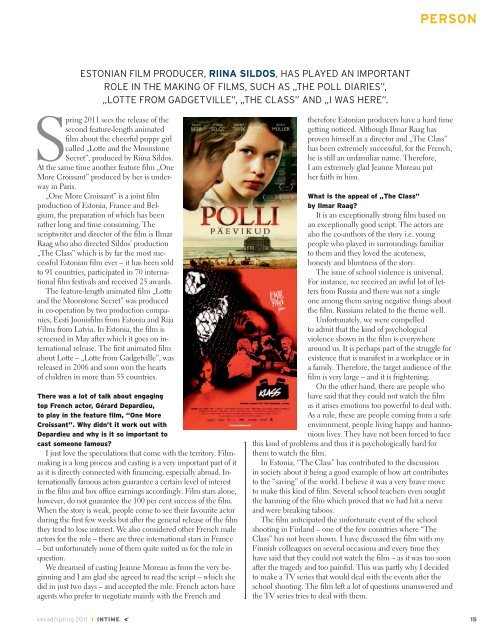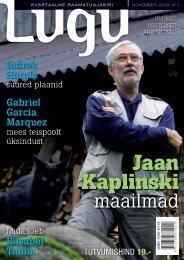in tiMe
rubriik - Profimeedia
rubriik - Profimeedia
- No tags were found...
You also want an ePaper? Increase the reach of your titles
YUMPU automatically turns print PDFs into web optimized ePapers that Google loves.
person<br />
Estonian film producer, Ri<strong>in</strong>a Sildos, has played an important<br />
role <strong>in</strong> the mak<strong>in</strong>g of films, such as „The Poll Diaries”,<br />
„Lotte from Gadgetville”, „The Class” and „I Was Here”.<br />
Spr<strong>in</strong>g 2011 sees the release of the<br />
second feature-length animated<br />
film about the cheerful puppy girl<br />
called „Lotte and the Moonstone<br />
Secret”, produced by Ri<strong>in</strong>a Sildos.<br />
At the same time another feature film „One<br />
More Croissant” produced by her is underway<br />
<strong>in</strong> Paris.<br />
„One More Croissant” is a jo<strong>in</strong>t film<br />
production of Estonia, France and Belgium,<br />
the preparation of which has been<br />
rather long and time consum<strong>in</strong>g. The<br />
scriptwriter and director of the film is Ilmar<br />
Raag who also directed Sildos’ production<br />
„The Class” which is by far the most successful<br />
Estonian film ever – it has been sold<br />
to 91 countries, participated <strong>in</strong> 70 <strong>in</strong>ternational<br />
film festivals and received 25 awards.<br />
The feature-length animated film „Lotte<br />
and the Moonstone Secret” was produced<br />
<strong>in</strong> co-operation by two production companies,<br />
Eesti Joonisfilm from Estonia and Rija<br />
Films from Latvia. In Estonia, the film is<br />
screened <strong>in</strong> May after which it goes on <strong>in</strong>ternational<br />
release. The first animated film<br />
about Lotte – „Lotte from Gadgetville”, was<br />
released <strong>in</strong> 2006 and soon won the hearts<br />
of children <strong>in</strong> more than 55 countries.<br />
There was a lot of talk about engag<strong>in</strong>g<br />
top French actor, Gérard Depardieu,<br />
to play <strong>in</strong> the feature film, “One More<br />
Croissant”. Why didn’t it work out with<br />
Depardieu and why is it so important to<br />
cast someone famous?<br />
I just love the speculations that come with the territory. Filmmak<strong>in</strong>g<br />
is a long process and cast<strong>in</strong>g is a very important part of it<br />
as it is directly connected with f<strong>in</strong>anc<strong>in</strong>g, especially abroad. Internationally<br />
famous actors guarantee a certa<strong>in</strong> level of <strong>in</strong>terest<br />
<strong>in</strong> the film and box office earn<strong>in</strong>gs accord<strong>in</strong>gly. Film stars alone,<br />
however, do not guarantee the 100 per cent success of the film.<br />
When the story is weak, people come to see their favourite actor<br />
dur<strong>in</strong>g the first few weeks but after the general release of the film<br />
they tend to lose <strong>in</strong>terest. We also considered other French male<br />
actors for the role – there are three <strong>in</strong>ternational stars <strong>in</strong> France<br />
– but unfortunately none of them quite suited us for the role <strong>in</strong><br />
question.<br />
We dreamed of cast<strong>in</strong>g Jeanne Moreau as from the very beg<strong>in</strong>n<strong>in</strong>g<br />
and I am glad she agreed to read the script – which she<br />
did <strong>in</strong> just two days – and accepted the role. French actors have<br />
agents who prefer to negotiate ma<strong>in</strong>ly with the French and<br />
therefore Estonian producers have a hard time<br />
gett<strong>in</strong>g noticed. Although Ilmar Raag has<br />
proven himself as a director and „The Class”<br />
has been extremely successful, for the French,<br />
he is still an unfamiliar name. Therefore,<br />
I am extremely glad Jeanne Moreau put<br />
her faith <strong>in</strong> him.<br />
What is the appeal of „The Class”<br />
by Ilmar Raag?<br />
It is an exceptionally strong film based on<br />
an exceptionally good script. The actors are<br />
also the co-authors of the story i.e. young<br />
people who played <strong>in</strong> surround<strong>in</strong>gs familiar<br />
to them and they loved the acuteness,<br />
honesty and bluntness of the story.<br />
The issue of school violence is universal.<br />
For <strong>in</strong>stance, we received an awful lot of letters<br />
from Russia and there was not a s<strong>in</strong>gle<br />
one among them say<strong>in</strong>g negative th<strong>in</strong>gs about<br />
the film. Russians related to the theme well.<br />
Unfortunately, we were compelled<br />
to admit that the k<strong>in</strong>d of psychological<br />
violence shown <strong>in</strong> the film is everywhere<br />
around us. It is perhaps part of the struggle for<br />
existence that is manifest <strong>in</strong> a workplace or <strong>in</strong><br />
a family. Therefore, the target audience of the<br />
film is very large – and it is frighten<strong>in</strong>g.<br />
On the other hand, there are people who<br />
have said that they could not watch the film<br />
as it arises emotions too powerful to deal with.<br />
As a rule, these are people com<strong>in</strong>g from a safe<br />
environment, people liv<strong>in</strong>g happy and harmonious<br />
lives. They have not been forced to face<br />
this k<strong>in</strong>d of problems and thus it is psychologically hard for<br />
them to watch the film.<br />
In Estonia, “The Class” has contributed to the discussion<br />
<strong>in</strong> society about it be<strong>in</strong>g a good example of how art contributes<br />
to the “sav<strong>in</strong>g” of the world. I believe it was a very brave move<br />
to make this k<strong>in</strong>d of film. Several school teachers even sought<br />
the bann<strong>in</strong>g of the film which proved that we had hit a nerve<br />
and were break<strong>in</strong>g taboos.<br />
The film anticipated the unfortunate event of the school<br />
shoot<strong>in</strong>g <strong>in</strong> F<strong>in</strong>land – one of the few countries where “The<br />
Class” has not been shown. I have discussed the film with my<br />
F<strong>in</strong>nish colleagues on several occasions and every time they<br />
have said that they could not watch the film – as it was too soon<br />
after the tragedy and too pa<strong>in</strong>ful. This was partly why I decided<br />
to make a TV series that would deal with the events after the<br />
school shoot<strong>in</strong>g. The film left a lot of questions unanswered and<br />
the TV series tries to deal with them.<br />
kevad/spr<strong>in</strong>g 2011 I INTIME 15
















